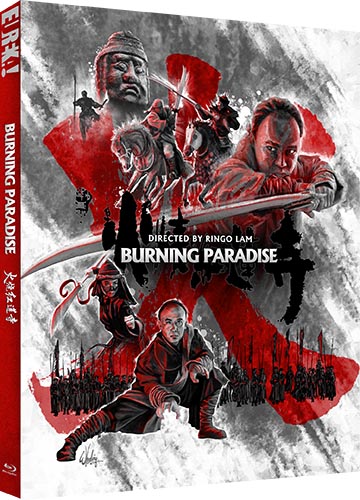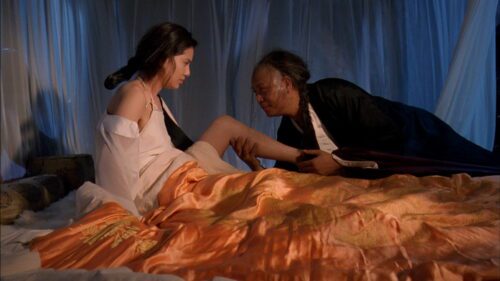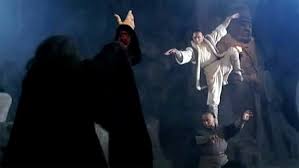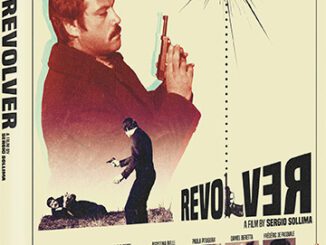Burning Paradise (1994)
Directed by: Ringo Lam
Written by: Wan Choi, Yin Nam
Starring: John Ching, Kam-Kong Wong, Willie Chi, Yamson Domingo
HONG KONG
AVAILABLE ON BLU-RAY: 29TH MAY, from EUREKA ENTERTAINMENT
RUNNING TIME: 104 mins
REVIEWED BY: Dr Lenera

It’s the Qing dynasty, and the Manchus have burned down the Shaolin Temple. Shaolin disciple Fong Sai-yuk and his injured master, Chi Nun, escape to an abandoned shack, where they meet prostitute Dau Dau, who’s also on the run from the authorities, and who helps them hide. However, next morning soldiers arrive, killing Chi Nun and taking Fong and Dau Dau, plus other Shaolin, to the Red Lotus Temple which is ruled by the tyrannical Elder Kung who who forces the inmates to work as slave labour and keeps women as his forced concubines. Fong does his best to battle his kidnappers, one of whom turns out to be ex-Shaolin student Hung Hei-gun, but is beaten and left for dead in a pit of corpses….

Ringo Lam made his name as a director of gritty modern urban thrillers such as City On Fire [the last part of which apparently did not serve as a major inspiration for Reservoir Dogs, honestly] and Full Contact, but he did make one period martial arts movie. The reason that he never made another one could be because this one flopped hard, but that doesn’t mean at all that it’s not worthy of your time; after all, such internationally popular Hong Kong films such as The Killer and Eastern Condors were failures at home too. Set mostly underground, and curiously reminiscent of Indiana Jones And The Temple Of Doom, it’s actually a remake of a tale told several times on the screen, beginning with a 1929 serial and including a 1965 Shaw Brothers production starring Jimmy Wang Yu. I haven’t seen any earlier version, but I wouldn’t be surprised if this was one remake was better than all of them, even allowing for the fact that the fighting is bound to be different. This was the ‘9os, and the success of Once Upon A Time In China inaugurated a new wave of kung fu epics set in the past, but no more static cameras observing long takes of people battling it out and doing a few leaps [while a sound like flags blowing played on the soundtrack]; this time we had faster cuts and characters jumping about all over the place. Of course the good ones were still able to showcase actual styles and techniques amidst the spectacle, and Burning Paradise is a fine example of this, though I doubt whether the “Royal Heaven And Earth” style that the main bad guy eventually shows himself to be a master of, which involves the throwing of ink as projectiles, is a genuine one. You could say that the frequent humour, with some characters frequently uttering funny lines while he even get somebody slightly below somebody else rising up and bashing the other man’s chin with his head, jars with the otherwise pretty dark tone, this being virtually a horror film in places, with a rather Gothic atmosphere pervading many scenes, and one of the most truly evil and frightening villains in martial arts films of the period.
The opening gloomy singing and chanting immediately clues you in to the fact that this film will be a little different to the norm. The credits take place over a painting of a fire surrounded by people; it morphs in to real footage. The fire is shown to be one into which soldiers are throwing things; text tells us that this is the sacking of the Shaolin Temple. Many Hong Kong films depict this event [though often wrongly dated] or follow on from it, especially ones from Shaw Brothers. Inside an idol is being smashed up, then we cut to two people on horseback riding across a sandy desert. This is Shaolin disciple Fong Sai-yuk and master Chi Nun. The latter falls off his horse and twists his leg; then some soldiers turn up. Chi Nun’s horse rides off without him, so Fong is obliged to stand and fight. He battles the attackers and does extremely well in a blistering sequence of combat which is a tremendous start to the action. Fong’s horse also buggers off, so he has to carry his master. “Uncle, you’re too heavy”, “Well, I don’t chant as much now, I just eat and sleep”. The banter between the two is really good, and it gets even better when they encounter prostitute Dau Dau hiding in the same barn as they are. Chi Nun shows himself to be not exactly saintly with his lecherous comments about her, while Fong is immediately besotted in a more innocent way, asking her intimate details about her profession but not in an intentionally lewd way. While hiding from more soldiers, one of them gropes Dau Dau; we don’t find out who it is but it’s probably Chi Nun. The interplay is huge fun and it’s almost a shame that it’s interrupted and is never able to come back; I’d have been happy for us to follow the adventures of these three traveling around. But no; cannons are fired and an even more wounded Chi Nun is slain by Crimson, the leader of the soldiers. Wong has to give up his sword when threatened with Dau Dau being killed, and the pair join other Shaolin men being carted off to the Red Lotus Temple.
There, they’re welcomed by a fearsome lady named Brooke who tells them, “Here there will be no martial arts and no Buddhist chants”, but of course we know that the former isn’t going to be true! Indeed the minute after we get a series of brawls, beginning with one of the prisoners who defies Brooke being invited to go and fight her, but the trouble is that they don’t always play fair in this place, with a lever being pressed and a load of spikes coming up through the ground, one of them impaling the man’s foot. Fong decides to help and even has a go at killing Elder King himself, Elder King being the head of the place who likes to calmly watch combat while occasionally swinging things in his favour. Fong is made especially angry when he sees that Hung Hei-gun the foreman was a Shaolin student, but despite his sterling efforts is knocked down into a pit, where he encounters one alive person in a pile of dead bodies, another elderly Shaolin master named Chi Seen, who was also thrown down there and has been surviving on rats. Now you probably expect Chi Seen to train Wong in some amazing technique, but sorry, this doesn’t happen. In fact Chi Seen doesn’t turn out to be particularly important at all. Meanwhile, Tou Tou is taken as Kung’s concubine. When offered a gift by Kung for the services she’s about to provide for him, she requests that Fong be released. Kung initially agrees, but reneges when he realises that Tou Tou and Fong like each other. Elsewhere a love triangle is also revealed between Brooke, Hung,who thinks he’s too lowly for the former, and priestess Luk, but this doesn’t slow down things at all as elaborate duels, with most of the main characters getting to fight each other, and vicious bloodshed continues to dominate, while the Brooke and Hung relationship actually becomes one that we really care about and are shocked by its tragic end. Things seem pretty hopeless at times, even when two character are revealed to be on different sides than they seemed.

People hurl themselves everywhere, doing impossible acrobatics, but it’s exhilarating to watch when filmed well as it is here, the editing just right as are the amount of closeups employed. Lam really should have been given the chance to do this sort of thing again, though of course its Chris Lee’s [one of the guys who falls out of the front of the breaking bus onto the pavement in Police Story] stunning choreography which deserves as much or more credit. The opening fight of Wong battling a load of soldiers really sets a high standard, with Wong, wielding a sword which he does throughout when facing armed opponents, jumping on to a enemy horse twice, fighting others on horseback and being attacked by someone with that favourite weapon of many, the flying guillotine. Then in the temple the unnamed student, using a chain, battles a sword-wielding Brooke on a rather precarious bridge with a fire blazing under it before Wong goes to help in a thrilling set piece where the fantastical athleticism doesn’t stop us from being rather concerned about both characters. Wong then has to fight Hung, and again later, but in the second fight Hung they keep saving each other for reasons I won’t reveal. Later on Wong fights Brooke in Dau-Dau’s bedroom while trying to stop Dau-Dau from being crushed by a collapsing bed in a great display of skillful staging which makes the ridiculous seem plausible. Wong Vs Crimson then Elder King almost conceal the fact that these two baddies aren’t played by martial artists. Elder King is dispatched a little quickly considering how powerful he is, but never mind; every one of Kam Kong-Wong’s scenes as the character is memorable. The loathsome but almost hypnotically watchable tyrant is even given a speech [while holding a severed head] where he explains why he turned into such a bag guy; him getting old and fearing death was apparently the motivation for him deciding to do exactly what he wanted. Wong, a calligrapher and painter in real life, makes this plausible. Against him Willie Chi, playing Fong Sai-Yuk, the fictional but oft-portrayed folk hero, doesn’t really have enough screen presence, even though he can certainly do the martial arts.
In a sense the biggest character in the film is the Red Lotus Temple itself, a place where the visitor is greeted with a pile of skulls and two arms protruding out of the ground, somebody obviously having been buried alive there. The underground temple, realised by often claustrophobic but convincing sets sets [you can certainly see where the high budget went], is a tremendous setting where you never know when a trapdoor, spikes or poison gas are going to suddenly reveal themselves. A statue of Buddha revealing a nasty defense mechanism after a sutra is sung is a bit of a shocker, as well as being a nice dark bit of irony. Then there’s a magnificent chamber of dead, preserved concubines straight out of a Gothic chiller, though the horror highlight is probably when Elder King approaches Tou Tou’s bed, there’s a real sense of fear here. Their scenes together are rife with uneasy, even disturbing tension. At one point he becomes furious when she doesn’t resist hiss advances and gets violent with her before taking out his real wrath out on another concubine who happens to be nearby; her death could be the bloody highlight in a film rife with usually convincing beheadings [including one of a horse], slashings, impalings, hangings, burnings, hangings, choppings in half, blood spattering onto things and Elder King painting with blood onto murals in moments of surprising delirium. As, as I mentioned before, there’s a chuckle every now and again; most of these seem well judged and placed, making us laugh while not detracting from the overall intensity of the piece, though a few seem rather random and even intrusive, but not that damaging overall really. The relationship between Wong and Dau-Dau continues to be amusing and sweet, like when he’s embarrassed by having to suck poison from a snake out of her arm.
Burning Paradise has a fairly happy ending which is unusual for a Lam film, but, by the time it comes around, we’re rather pleased by this. It’s an unsung minor classic of martial arts cinema, yet many of its most memorable moments don’t even involve fighting.
Rating: 









SPECIAL FEATURES
Limited Edition O-Card slipcase featuring new artwork by Darren Wheeling [2000 copies]
1080p HD presentation on Blu-ray from a 2K restoration of the films’ original 35mm camera negative
Cantonese and English audio options (both in their original mono presentations)
Despite most of the film being set underground, this excellent presentation is rarely samey in appearance, offering many shades of muted colours while fire and blood is often allowed to boldly stick out. The picture is very sharp and detail is very precise.
Optional English Subtitles, newly translated for this release
I noticed a few mistakes here. They certainly don’t detract from the film’s overall quality, but maybe these subtitles were done is a rush?
Brand new feature length audio commentary by Asian film expert Frank Djeng (NY Asian Film Festival)
Djeng delivers one of his very best commentary tracks here, one absolutely jam-packed with information and oozing enthusiasm for a film he admires considerably, even thinking that its lack of stars works to its advantage. Djeng was able to unearth some production information for this one, such as Lam being inspired by make this by a painting by Wong of a Buddha, and Wong being so nervous about his sex scene that he drank two bottles of beer and had to be stopped by Lam from drinking a third, while wait till you hear why Johnny To stopped Chi’s career. Djeng relates themes to other Lam films, and explains some jokes that are lost on non-Chinese people, such as characters talking like modern folk. He sometimes makes references to an interview he carried out with Wong to be intended for inclusion on this disc; he says that it was toolong so will appear on another disc with a film also starring Wong on it, but considering the amount of special features that exist on many Blu-Ray discs, that seemed odd until he explained that its length meant that it couldn’t be edited in time.
Archival Interview with Tsui Hark [4 mins]
From the Hong Kong Legends DVD, this very short interview does reveal that Hark loves the movie despite thinking that material, which he liked as a kid, seems silly as an adult, that he was originally going to direct it himself but was busy making Green Snake [Djeng says it was The Lovers], and that Golden Harvest were worried about the budget escalating but Hark let Lam carry on as before.
Original theatrical trailer
A Limited Edition collector’s booklet featuring new writing by James Oliver [2000 copies]
Perhaps the most interesting of the movies which came out during Hong Kong’s ’90s traditional martial arts movie phase, “Burning Paradise” comes to Blu-Ray in the usual terrific Eureka release. Highly Recommended!





Be the first to comment